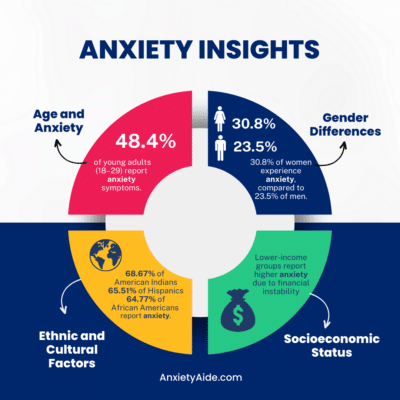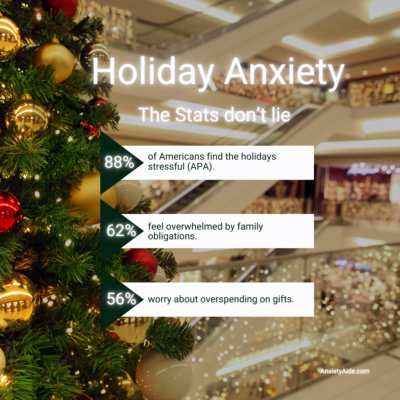
Who’s Feeling the Most Anxious? Let’s Dive In
Understanding Anxiety-Ridden Demographics: A Closer Look Anxiety disorders affect millions globally, but not all demographics experience it equally. This article explores the most anxiety-prone groups

In a world where the news seems to have as many plot twists as a soap opera, feeling anxious is almost as common as sipping your morning coffee. Whether it’s the ongoing saga of COVID-19, the emergence of monkeypox, or just the general doom-scrolling habit we’ve all picked up, anxiety levels can shoot through the roof faster than you can say “stress ball.” But fear not, my fellow worry warriors! There are plenty of natural remedies for anxiety that can help you regain your zen and keep calm amidst the chaos. Learn more about natural remedies here. In this guide, we’ll explore practical mental health tips and healthy coping strategies that not only soothe the mind but also put a smile on your face. From tried-and-true stress relief techniques to a few quirky tricks that might just become your new best friend, we’ve got you covered, including Anxiety Aide, a natural solution that’s worth a try if you’re looking for gentle support (Find out more about Anxiety Aide). So, take a deep breath and let’s embark on this journey to anxiety relief together.
The pandemic has been a significant source of anxiety for many. Uncertainty about health, the economy, and social isolation have amplified stress levels worldwide. This unprecedented situation has challenged our mental resilience, making anxiety more prevalent. Explore more on pandemic-related anxiety. The constant stream of news updates and changing guidelines can leave us feeling overwhelmed. It’s crucial to recognize that these feelings are normal under such circumstances. However, understanding how to manage anxiety during a pandemic can help us maintain mental well-being. Incorporating stress relief techniques, such as mindfulness and regular exercise, can create a sense of routine and stability. Additionally, natural remedies for anxiety, like chamomile or magnesium, can offer gentle support (Read more on how magnesium helps). Staying connected with loved ones, even virtually, helps sustain emotional bonds. By acknowledging the impact of the pandemic on our mental health and taking proactive steps, we can better navigate these challenging times.
Constant exposure to negative news can significantly impact our mental health. News outlets often focus on crises and disasters, which can heighten our sense of anxiety and fear. This phenomenon, known as “doom-scrolling,” can create a vicious cycle of consuming distressing information, leading to increased stress and anxiety. Discover how doom-scrolling affects us. It’s important to be aware of how this information affects us and take steps to manage its impact. Limiting news intake to specific times of the day can help prevent overwhelming feelings. Engaging in healthy coping strategies, such as taking breaks and practicing relaxation techniques, can counterbalance the stress. Additionally, focusing on positive or neutral news stories can provide a more balanced perspective. Tips on managing news consumption. By being mindful of our media consumption, we can protect our mental health and reduce anxiety related to the constant influx of negative news.
Incorporating stress relief techniques into your daily routine can be an effective way to manage anxiety naturally. Practices like deep breathing exercises, meditation, and yoga are excellent for promoting relaxation and reducing stress. These activities help calm the nervous system, leading to a reduction in anxiety symptoms. Find techniques for stress relief. Mindfulness meditation, for instance, encourages focusing on the present moment and can diminish the power of anxious thoughts. Additionally, physical activities such as walking or jogging release endorphins, which are natural mood boosters. Establishing a regular exercise regimen not only supports physical health but also enhances mental well-being. Another helpful technique is progressive muscle relaxation, which involves tensing and releasing muscle groups to alleviate tension. Learn more about progressive muscle relaxation. Incorporating these techniques into your routine allows you to build resilience against stressors. By finding the right combination of practices, you can create a personalized stress relief strategy that supports your mental health.
Adopting healthy coping strategies can significantly improve how you handle anxiety. These strategies often involve lifestyle adjustments that promote overall well-being. For starters, maintaining a balanced diet rich in nutrients is crucial, as certain vitamins and minerals can influence mood and stress levels. Discover dietary choices for anxiety. Regular sleep patterns are also vital; a consistent sleep schedule fosters better mental health by allowing the brain to rest and recharge. Social connections play a critical role in coping with anxiety. Engaging with friends and family, even through digital means, can provide emotional support and reduce feelings of isolation. Journaling is another effective strategy, as it allows you to process your thoughts and emotions in a healthy way. Identifying and challenging negative thought patterns can also help in managing anxiety. Effective journaling for mental health. By implementing these healthy coping strategies, you can create a supportive environment that reduces anxiety and enhances your mental resilience.
Managing anxiety involves a proactive approach to daily life. Start by setting realistic goals and breaking them into manageable steps to prevent feeling overwhelmed. Prioritize tasks and delegate when possible to reduce stress. Explore goal-setting strategies for stress management. Incorporating routine into your day creates stability, helping to ground your mind. Establishing boundaries, particularly with work or social obligations, ensures you have time for self-care. Practicing mindfulness can enhance your ability to focus on the present, reducing anxious thoughts about the future. Breathing exercises, like the 4-7-8 technique, can quickly calm your mind during stressful moments. How breathing exercises help with anxiety. Additionally, incorporating gratitude practices can shift focus from worries to positive aspects of life. Regularly taking time for hobbies or activities you enjoy can provide a mental break and improve mood. By integrating these practices into your daily routine, you can create an environment that fosters tranquility and helps manage anxiety effectively.
Cultivating a positive mindset is essential for maintaining mental calmness and resilience against anxiety. Start by practicing self-compassion; acknowledge that it’s okay to feel anxious and treat yourself with kindness. Engage in positive self-talk to challenge and replace negative thoughts with affirming ones. Techniques for positive self-talk. Surround yourself with supportive and uplifting individuals who encourage optimism. Setting aside time each day to focus on what you’re grateful for can shift your perspective and enhance emotional well-being. Visualization techniques, where you imagine successful outcomes or calming scenes, can reinforce positivity and reduce stress. Additionally, consuming uplifting content, such as motivational podcasts or inspiring books, can help foster a brighter outlook. Books and podcasts to boost positivity. Mindful living, where you consciously appreciate small daily joys, contributes to a more positive mindset. By actively choosing positivity and focusing on growth and gratitude, you can build a mental environment that supports peace and reduces anxiety.
Tags: anxiety, anxiety attack, anxietyaide, high anxiety

Understanding Anxiety-Ridden Demographics: A Closer Look Anxiety disorders affect millions globally, but not all demographics experience it equally. This article explores the most anxiety-prone groups

The holidays are often described as “the most wonderful time of the year,” but let’s be honest—sometimes, they feel like a whirlwind of chaos, expectations,
*THESE STATEMENTS/PRODUCTS HAVE NOT BEEN APPROVED BY OR EVALUATED BY THE FOOD AND DRUG ADMINISTRATION AND ARE NOT INTENDED TO DIAGNOSE, TREAT, CURE OR PREVENT ANY DISEASE.